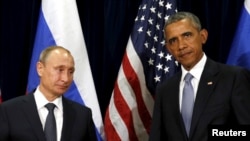With just two moves, Russia may have upended the U.S. role in the Middle East.
Working with its allies in Tehran and Damascus, Moscow first moved 28 attack and transport aircraft and enough housing for 2,000 troops to Latakia, Syria. Then Moscow set up a security and intelligence-sharing cell in Baghdad, Iraq, also in coordination with Iran and Syria, to fight Islamic State group (IS) extremists.
The result is that Russia has created a new Moscow-Tehran-Damascus axis of power in the region where it is “the only superpower willing to fight," said Michael Pregent, a visiting fellow at National Defense University.
“This completely undermines and marginalizes the U.S. fight against the Islamic State and supplants any leverage we have. We are not doing a thing,” Pregent said, criticizing what he called President Barack Obama’s “slow-burn” strategy in the region.
Other analysts have said that for months Washington had been losing its influence in Baghdad to neighboring Iran. Washington’s airstrike campaign also has done little to oust the IS militants from Iraq or Syria, and the Pentagon’s efforts to train a rebel force to fight the extremists has failed.
Elias Groll in Foreign Policy wrote that Baghdad’s decision to share information with Russia, Syria and Iran to combat Islamic State militants will “take the fight to the enemy in a way Washington has been unwilling to do.”
And setting up an active base to prop up Syrian President Bashar al-Assad “has greatly increased Moscow’s leverage in the region and over the final outcome of the four-year-old civil war there,” Groll said.
US sticking to objectives
Moscow’s tactical moves have been effective, says Reva Bhalla, Stratfor Vice President for Global Analysis.
“Diplomatically, Russia is definitely tarnishing the image of the U.S. Russia comes out as the problem-solver and the U.S. looks like it’s fumbling,” she said.
By willingly putting military equipment on the ground with the intention to fight IS extremists, Russia, she says, is sending a very clear message to the region that it is willing to be a credible partner.
“Whereas before ... many have looked at Russia and said 'you are just a lot of talk' — now this whole Syria situation is having everyone recheck their assumptions," Bhalla said. By inserting itself into the Syrian conflict to become an indispensable player, she added, Moscow has essentially set itself up for negotiations on other issues such as Ukraine.
But the U.S. may not have compromised its objectives in the region, sticking to its longer-term, broader security goals regardless of Moscow’s maneuvers.
“The U.S. objective was to take a step back, and by doing so they were freeing themselves up to focus on other major priorities, knowing that military entrenchment there is a pretty thankless effort after a while," Bhalla said.
Ripple effects
Some analysts have said the Russia-Syria-Iran alliance will also have a ripple effect on Washington’s major regional ally, Kurdistan, in northern Iraq.
Kurdistan is split between two major political forces: that of the pro-West Kurdish Democratic Party (KDP) led by current Kurdistan Regional President Masood Barzani, and the pro-Iran Patriotic Union of Kurdistan and Gorran parties.
“Whenever you have regional competitions escalate, the more you are going to see fragmentation within the Kurdistan political landscape,” Bhalla said. The security developments, she added, have created “an opening for Iran to get closer to certain Kurdish factions.”
That fragmentation could also quickly seep into Baghdad. On Monday, unnamed sources in Iraqi media were citing plans for a coup against the government of Haider al-Abadi in favor of his more pro-Iranian predecessor, Nouri al-Maliki.




